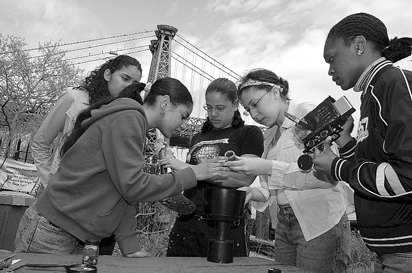By Jefferson Siegel
Their names are familiar, their achievments are historic…Marie Curie and radium, Jane Goodall and primatology, Margaret Mead and anthropology. The sciences are gender nonspecific, but the accomplishments of women in science are legendary.
Recently, future students of the environment gathered in East River Park for an afternoon of education and activism in the natural sciences. At a two-day seminar at the Lower East Side Ecology Center, 14 members of the Lower Eastside Girls Club had a hands-on learning experience with the fish, birds and assorted fauna that comprise the local ecosystem.
Inside the old Fireboat House, located in the park near Grand St., is a classroom filled with living examples of the natural sciences. Tara DePorte, director of environmental education at the center, pointed at a tank on the floor, noting that it was a “river-tank ecosystem filled with East River water.”
On the large fish swimming inside, Kate Zidar, another scientist at the center, elaborated: “Striped bass are really common around here. We catch them. You see them all the time coming out of the river. This one is a juvenile, very small. This time of year you can catch 35-inch striped bass.”
The room was also filled with the sounds of chirping birds, zebra finches from South Africa. In another glass case were crickets, anoles — a type of lizard — and tree frogs. “Sometimes they’re bright green,” DePorte said, “it depends on their mood and their temperature.”
As part of its Earth Day programs, the ecology center hosted New York Women in Science, promoting activism, education and research for young women in the natural science — so the nine-year-old Girls Club was a natural.
Zidar added, “A lot of these kids never come to the water, so just making the trip, by the time they get here, it’s such a world away that you really get their attention. This location really lends itself to that kind of education.”
DePorte laid out the day’s agenda: “We’re going to be doing an ‘observe your environment,’ what’s around you, what can you see, what’s in the air, on land, in the water,” she said. The young women, from schools including the Satellite Academy of Arts on E. Houston St. and the Leadership and Public Service High School on Trinity Pl., split into two groups.
DePorte led her group in studies of composting and soil. Zidar talked about issues like East River exploration, water pollution and uses of the river. Her group walked a few steps to the pilings by the river’s edge, just south of the Williamsburg Bridge. As the girls peered over the railing, Zidar conducted a “plankton tow” by dropping a sock-shaped bag on a rope into the river. Pulling it up, the water drained out, leaving a cup on the end filled with tiny river residents. She poured the contents into a container and the girls crowded around to see what had been caught. As they squinted at a tiny fish and some smaller fauna, Zidar told them, “The East River is not a river, it’s a tidal street.”
On the other side of the building, DePorte and her group fanned out through the park with notebooks and shovels. Plants, grass, weeds, rock formations and bugs were spotted and noted. Then the shovels dug just below the surface, where worms, grubs and roots came to light.
The girls gathered their specimens and notebooks and returned to the classroom. There, they looked at the day’s catch under magnifying glasses as DePorte and Zidar moved along the rows of tables, describing what they saw.
As the girls examined the microbes more closely under microscopes, DePorte, who has traveled to the Caribbean and South America for scientific research, gave them a good reason to pursue their studies: “As a science student, you get to go to really cool places.”
“Anytime people come down here they’re very excited,” added DePorte. “We’ve had Saturday open houses, people having picnics will come in and be amazed. The kids love it, but the adults, they’re even more amazed and they want to come back and ask, ‘When are you open?’”
The center is open Saturdays from 12 p.m.-4 p.m. through September. During the week, they offer outreach programs to public schools, community centers and after-school programs in the Lower East Side. For more information, visit https://lesecologycenter.org/.
































